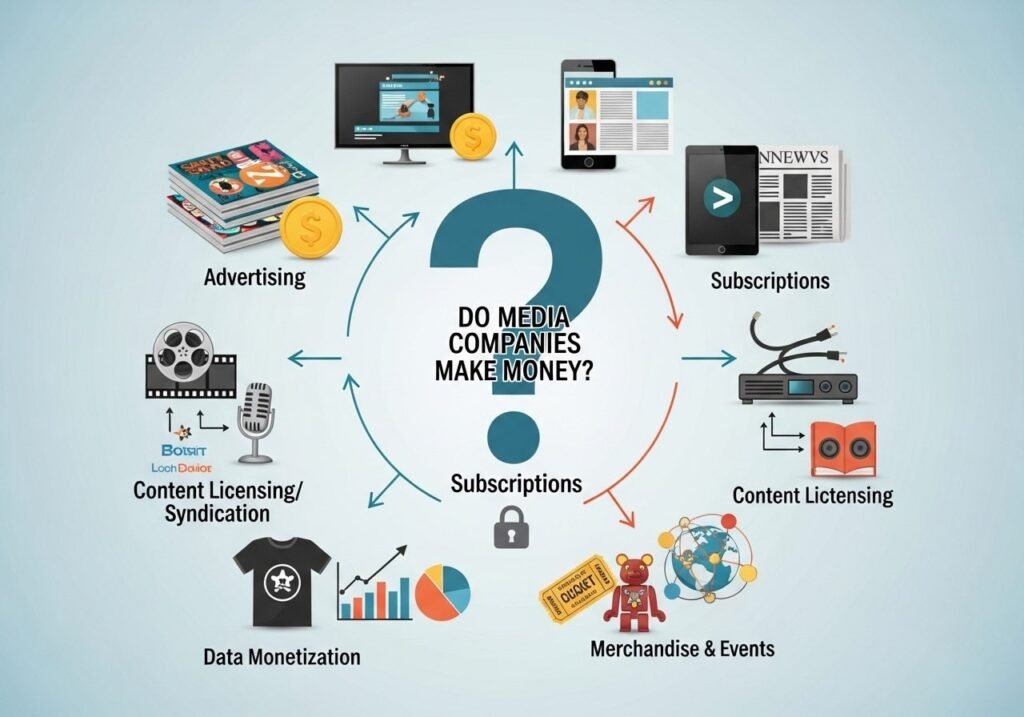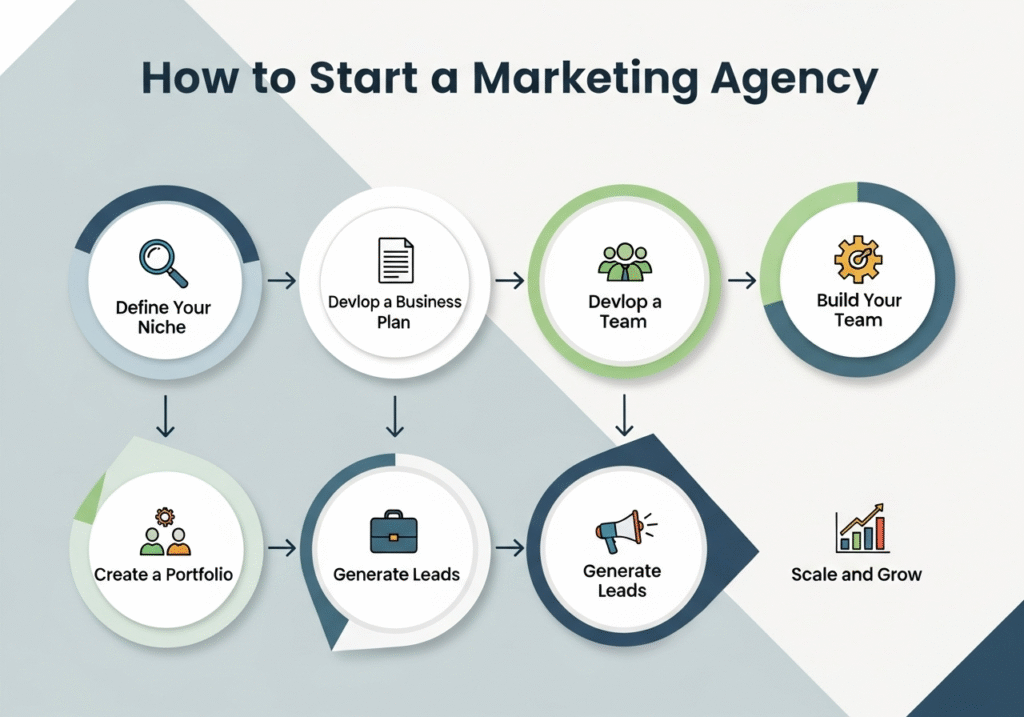Starting your own media company might seem like a big dream, but with the right plan and dedication, it’s totally possible. Whether you want to create content, share news, or help other businesses with their marketing, learning how to start a media company is the first step toward building something amazing.
The best part? You can even figure out how to start a media company with no money if you’re willing to get creative and work smart.
What is a Media Company?
A media company is a business that creates, produces, and distributes content to audiences. This content can be anything from news articles and videos to podcasts, social media posts, and advertisements. Media companies connect people with information, entertainment, and services they need or want.
Think of media companies as storytellers and information bridges. They take ideas, events, or messages and share them with the world through various channels, including websites, TV, radio, social media, and print materials.
Types of Media Companies
Media companies come in many different forms:
- Traditional Media: Newspapers, magazines, TV stations, and radio stations
- Digital Media: Online publications, YouTube channels, podcast networks
- Social Media: Companies that create content specifically for platforms like Instagram, TikTok, or Facebook
- Advertising Agencies: Companies that create marketing content for other businesses
- Production Houses: Businesses that make videos, films, or audio content
Media Company Examples
Looking at successful media companies can give you great ideas for your own business. Here are some well-known examples:
Large Media Companies
- Disney: Creates movies, TV shows, and owns multiple media properties
- Netflix: Streams movies and TV shows while also producing original content
- BuzzFeed: Started as a website and expanded into video, news, and social media content
- Vice Media: Covers news and culture through various digital platforms
Smaller Media Companies
- Morning Brew: Started as an email newsletter and grew into a major business publication
- The Dodo: Focuses on animal-related content across social media platforms
- Barstool Sports: Began as a blog and became a major sports and entertainment media company
These examples show that media companies can start small and grow big, or focus on specific topics that interest their audience.
Do Media Companies Make Money?\

Yes, media companies definitely make money, but they use different ways to earn revenue:
Revenue Streams for Media Companies
Advertising Revenue
- Display ads on websites
- Sponsored content and partnerships
- Social media advertising
- Video ad placements
Subscription Services
- Monthly or yearly subscription fees
- Premium content access
- Email newsletter subscriptions
- Membership programs
Product Sales
- Merchandise related to your brand
- Digital products like courses or ebooks
- Physical products that match your audience’s interests
Client Services
- Content creation for other businesses
- Marketing and advertising services
- Consulting and strategy work
Event Hosting
- Conferences and workshops
- Virtual events and webinars
- Networking events for your audience
The key to making money as a media company is understanding your audience and providing value they’re willing to pay for, either directly or through attracting advertisers who want to reach that audience.
How Much Does it Cost to Start a Media Company?
The cost to start a media company varies greatly depending on what type of media business you want to create. Here’s a breakdown of potential costs:
Basic Digital Media Company Startup Costs
Essential Expenses (Monthly)
- Domain name: $10-15 per year
- Website hosting: $10-50 per month
- Basic design tools: $20-50 per month
- Content management system: $0-100 per month
Equipment Costs (One-time)
- Computer or laptop: $500-2000
- Camera (if creating video content): $200-1000
- Microphone for audio content: $50-300
- Basic lighting equipment: $100-500
Optional Professional Services
- Logo and branding design: $200-2000
- Professional website development: $1000-10000
- Legal consultation for business setup: $500-2000
- Accounting software: $10-50 per month
Traditional Media Startup Costs
Starting a traditional media company like a local newspaper or radio station requires much more money:
- Equipment and technology: $50000-500000
- Office space and utilities: $2000-10000 per month
- Staff salaries: $5000-50000 per month
- Legal and licensing fees: $5000-25000
Most people starting their first media company choose the digital route because it’s much more affordable and easier to scale.
How to Start a Media Company with No Money?
Starting a media company with no money is challenging but definitely possible. Many successful media companies started with almost nothing. Here’s how you can do it:
Free Tools and Platforms
Content Creation
- Use free writing platforms like Medium or LinkedIn for publishing
- Create social media accounts on Instagram, TikTok, Twitter, and Facebook
- Start a free blog on WordPress.com or Blogger
- Use free design tools like Canva for graphics
Video and Audio Content
- Use your smartphone camera for video recording
- Edit videos with free software like iMovie (Mac) or OpenShot (PC)
- Record podcasts using free software like Audacity
- Host podcasts for free on platforms like Anchor
Building Your Audience
- Share content consistently on social media
- Engage with other creators in your industry
- Comment on other blogs and publications
- Network through online communities and forums
Earning Your First Revenue
Once you start creating content and building an audience, you can begin earning money:
Immediate Income Opportunities
- Freelance writing for other websites
- Social media management for small businesses
- Sponsored posts once you have followers
- Affiliate marketing for products you believe in
Growing Your Revenue
- Launch a email newsletter with paid sponsorships
- Offer consulting services in your area of expertise
- Create digital products like guides or templates
- Host virtual events or workshops
The key is to start creating valuable content right away, even with basic tools. As you earn money, reinvest it into better equipment and professional services.
What Qualifies as a Media Company?
Understanding what qualifies as a media company helps you position your business correctly and take advantage of opportunities in the industry.
Legal Definition
From a legal standpoint, a media company is any business that:
- Creates original content for public consumption
- Distributes information or entertainment to audiences
- Operates through various communication channels
- Generates revenue through content-related activities
Business Structure Requirements
To officially qualify as a media company, you typically need:
- Registered business entity (LLC, Corporation, etc.)
- Clear content creation and distribution strategy
- Regular content publishing schedule
- Defined target audience
- Revenue model related to media activities
Industry Recognition
The media industry recognizes companies based on:
- Consistent content production
- Audience engagement and growth
- Professional standards and ethics
- Industry networking and partnerships
- Recognition from other media outlets
Whether you’re running a personal blog or a large news organization, if you’re creating and sharing content regularly with an audience, you can consider yourself a media company.
How to Start a Digital Media Company?
Digital media companies are the most popular choice for new entrepreneurs because they’re cost-effective and have huge growth potential.
What is a Digital Media Company?
A digital media company creates and distributes content primarily through online platforms. Unlike traditional media, which relies on TV, radio, or print, digital media companies utilize websites, social media, email, mobile apps, and streaming platforms to reach their audience.
Steps to Launch Your Digital Media Company
1. Choose Your Focus Area
Pick a specific topic or industry you’re passionate about:
- Technology and gadgets
- Health and wellness
- Food and cooking
- Travel and lifestyle
- Business and entrepreneurship
- Sports and fitness
- Fashion and beauty
2. Research Your Competition
Look at other digital media companies in your chosen area:
- What content do they create?
- How often do they publish?
- What platforms do they use?
- How do they make money?
- What gaps can you fill?
3. Define Your Unique Voice
Decide what makes your media company different:
- Your personal experience and expertise
- Unique perspective on topics
- Specific audience you want to serve
- Style of content you enjoy creating
4. Create Your Content Strategy
Plan what type of content you’ll create:
- Blog articles and guides
- Videos and tutorials
- Podcasts and interviews
- Social media posts
- Email newsletters
- Live streams and webinars
5. Build Your Digital Presence
Set up your online platforms:
- Professional website with your own domain
- Social media accounts on relevant platforms
- Email marketing system
- Analytics tools to track your progress
6. Develop a Publishing Schedule
Consistency is crucial for digital media success:
- Daily social media posts
- Weekly blog articles or videos
- Monthly newsletter or special content
- Regular engagement with your audience
How to Register a Media Company?
Properly registering your media company is essential for legal protection and professional credibility.
Choose Your Business Structure
LLC (Limited Liability Company)
- Protects your personal assets
- Flexible tax options
- Easier to manage than a corporation
- Good choice for most small media companies
Corporation
- More complex, but offers strong legal protection
- Easier to bring in investors later
- Required for certain types of media businesses
- Better for larger operations
Sole Proprietorship
- Simplest structure, but offers no liability protection
- Only suitable for minimal operations
- Not recommended if you plan to grow
Registration Process
1. Choose Your Business Name
- Make sure it’s available in your state
- Check if the domain name is available
- Ensure it reflects your media company’s focus
- Avoid names that are too similar to existing companies
2. File Legal Documents
- Register with your state’s business office
- Get an Employer Identification Number (EIN) from the IRS
- Apply for any required licenses or permits
- Register for state and local taxes
3. Set Up Business Banking
- Open a business bank account
- Get a business credit card
- Set up accounting systems
- Consider business insurance
4. Protect Your Intellectual Property
- Trademark your company name and logo
- Copyright your original content
- Register important domain names
- Create terms of service and privacy policies
How to Start a News Media Company

News media companies have special considerations because they deal with current events and factual reporting.
Learning News Media Requirements
Editorial Standards
- Commitment to accuracy and fact-checking
- Clear separation between news and opinion
- Transparent correction and retraction policies
- Ethical reporting guidelines
Legal Considerations
- Understanding libel and defamation laws
- Freedom of Information Act knowledge
- Source protection policies
- Fair use and copyright compliance
Credibility Building
- Professional journalistic training or experience
- Relationships with reliable sources
- Membership in journalism organizations
- Transparent funding and ownership disclosure
Steps to Launch Your News Media Company
1. Define Your News Focus
Choose what type of news you’ll cover:
- Local community news
- Industry-specific reporting
- International affairs
- Investigative journalism
- Breaking news and updates
2. Build Your Reporting Team
Start small but focus on quality:
- Experienced journalists or train yourself properly
- Reliable freelance contributors
- Professional editors and fact-checkers
- Legal advisors familiar with media law
3. Establish Editorial Processes
Create systems for professional news production:
- Story assignment and tracking
- Research and fact-checking procedures
- Editorial review and approval process
- Publication and distribution workflow
4. Develop Revenue Streams
News media companies can make money through:
- Digital subscriptions
- Advertising partnerships
- Sponsored content (clearly labelled)
- Events and conferences
- Premium newsletters
- Membership programs
How to Start a Media Agency Company?
Media agencies help other businesses with their marketing and advertising needs, making them a profitable type of media company.
Types of Media Agency Services
Digital Marketing Services
- Social media management and advertising
- Search engine optimization (SEO)
- Pay-per-click advertising (PPC)
- Email marketing campaigns
- Content marketing strategy
Content Creation Services
- Blog writing and website content
- Video production and editing
- Graphic design and branding
- Photography and visual content
- Podcast production and editing
Strategy and Consulting
- Marketing strategy development
- Brand positioning and messaging
- Campaign planning and execution
- Analytics and performance reporting
- Market research and competitor analysis
Building Your Media Agency
1. Identify Your Specialization
Focus on services you excel at:
- Choose 2-3 core services initially
- Become an expert in those areas
- Expand services as you grow
- Stay updated with industry trends
2. Create Your Service Packages
Develop clear offerings for clients:
- Basic, standard, and premium packages
- Monthly retainer options
- Project-based pricing
- Custom solutions for larger clients
3. Build a Strong Portfolio
Show potential clients your capabilities:
- Work on your own company’s marketing first
- Offer discounted services to build case studies
- Partner with other agencies for experience
- Document and showcase your results
4. Develop Client Acquisition Systems
Create ways to find and win new clients:
- Network with local business owners
- Use social media to demonstrate expertise
- Ask satisfied clients for referrals
- Attend industry events and conferences
- Create valuable free content that attracts clients
What is the Richest Media Company?
Understanding the most successful media companies can inspire your own goals and strategies.
Current Media Giants
Disney
- Revenue: Over $80 billion annually
- Success factors: Diverse entertainment properties, global reach, strong brand loyalty
- Key lesson: Build content that appeals to multiple generations
Comcast
- Revenue: Over $100 billion annually
- Success factors: Multiple revenue streams, infrastructure ownership, and content creation
- Key lesson: Combine distribution and content creation
Netflix
- Revenue: Over $30 billion annually
- Success factors: Original content investment, global expansion, data-driven decisions
- Key lesson: Adapt quickly to changing consumer preferences
What Makes Media Companies Successful?

Consistent Quality Content
- Regular publishing schedule
- High production standards
- Content that serves the audience’s needs
- Continuous improvement based on feedback
Strong Brand Identity
- Clear mission and values
- Recognizable visual style
- Consistent voice and messaging
- Memorable company personality
Audience Engagement
- Active community building
- Regular interaction with followers
- User-generated content opportunities
- Responsive customer service
Multiple Revenue Streams
- Don’t rely on just one income source
- Diversify across different revenue models
- Test new monetization methods
- Build recurring revenue when possible
Essential Steps to Launch Your Media Company
Now that you understand the different types of media companies and their requirements, here are the essential steps to get started:
Phase 1: Planning and Preparation (Weeks 1-4)
Week 1: Define Your Vision
- Choose your media company type and focus
- Research your target audience thoroughly
- Analyse competitors and market opportunities
- Write a simple business plan
Week 2: Legal and Financial Setup
- Register your business name and structure
- Open business bank accounts
- Set up basic accounting systems
- Research insurance and legal requirements
Week 3: Brand Development
- Create your company logo and visual identity
- Develop brand guidelines and voice
- Register domain names and social media handles
- Design basic marketing materials
Week 4: Technical Infrastructure
- Set up your website and hosting
- Install necessary software and tools
- Create content management systems
- Set up analytics and tracking
Phase 2: Content Creation and Launch (Weeks 5-12)
Weeks 5-8: Content Development
- Create your first batch of high-quality content
- Develop content templates and processes
- Build an editorial calendar
- Create standard operating procedures
Weeks 9-12: Soft Launch
- Start publishing content regularly
- Build your initial audience
- Test different content types and formats
- Gather feedback and make improvements
Phase 3: Growth and Expansion (Months 4-12)
Weeks 13-20: Audience Growth and Monetisation
- Focus on building your audience through consistent and valuable content.
- Utilise social media platforms to drive traffic to your website and engage with your audience.
- Experiment with different content formats like blogs, videos, podcasts, or webinars to discover what resonates with your audience.
- Begin incorporating monetization strategies like affiliate marketing, sponsored content, or selling digital products.
- Analyse audience behaviour using analytics tools and adjust your content strategy accordingly.
- Start offering freelance services or consulting if you have expertise in specific areas.
Weeks 21-24: Scale Your Content and Operations
- Begin outsourcing some tasks such as content creation, video editing, graphic design, or social media management if necessary.
- Expand your content team by hiring freelance writers, designers, or content strategists.
- Experiment with paid advertising (Google Ads, Facebook ads, etc.) to scale your audience faster.
- Set up email marketing campaigns to nurture your audience and encourage repeat visits to your website.
- Build an email list and start sending newsletters with valuable content and monetization opportunities like affiliate links or product promotions.
Phase 4: Establish Long-Term Sustainability (Months 12+)
Months 12-24: Focus on Diversification and Stability
- Explore additional revenue streams such as premium subscriptions, membership programs, or online courses.
- Continue refining your content strategy based on audience feedback and emerging industry trends.
- Look for partnerships and collaborations with other brands, influencers, or businesses that align with your values and target audience.
- Consistently engage with your community through social media, email newsletters, and interactive content like polls or surveys.
- Invest in more advanced tools or technology that can streamline your workflow and increase content production.
- Keep track of your finances, reinvesting profits into your business for growth and innovation.
Final Thoughts on Starting a Media Company
Starting a media company is a journey that requires a solid plan, creativity, and a consistent effort. The key to success lies in understanding your target audience, producing high-quality and valuable content, and diversifying your revenue streams. Whether you’re starting small with just a blog or social media account, or you have big dreams of building a global brand, the essential principles of starting a media company remain the same.
By staying focused, continually improving, and adapting to changes in the industry, you can create a successful media company that not only informs or entertains but also generates revenue and builds a loyal following.



